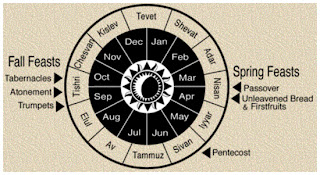Everyone likes holidays. You get to have a day off, hang out with friends and usually BBQ like today (Memorial Day) or have some type of abundant spread on the table (like Thanksgiving). And with it also comes some type of remembrance or celebration. That’s the fun with feasts. The Biblical feasts are similar but have so much more, for they connected holidays with specific acts to remember what God has accomplished for His people. The most detailed account of the feasts can be found in Leviticus 23. Unfortunately, because many Christians have crispy pages that happen to coincide with the OT, the feasts are largely unknown or ignored. Yet these OT feasts have great significance for even the NT.
I started to think about blogging this when posting a reminder that this weekend was Shavuot (pronounced Sha-voo-ot) which we know mostly by its Greek name Pentecost. Well, I will post some cool things I have learned over the years in my studies of the Pentateuch (Genesis-Deuteronomy), but first a brief introduction to feasts.
These feasts can be divided into two categories, fall feasts and spring feasts on the Jewish calendar. In fact, the Jewish Biblical Calendar starts off in the Spring with Passover. What can make this confusing for many is that this calendar is totally different than the calendar we use. Their months are different and the dates for holidays change every year.
The first four feasts (Passover, Unleavened Bread, First-Fruits, and Pentecost) are in the Spring and cover the first three months. Then a four month period of silence with no feasts. Then after these four months of no feasts or holidays comes the spring feasts, which occur all in one month! The 7th month brings with it three feasts (Trumpet, Day of Atonement, and Tabernacles). That’s a lot to take in, so just look at the picture I’ve included to help you. There is so much in these feasts that maybe we could do a series on each one and its NT theological significance.
In the Jewish Spring feasts, the first three feasts (Passover, Unleavened Bread, and First-Fruits) happen within a week of each other. The Passover celebrated God’s physical redemption out of Egypt. The feast of Unleavened Bread starts the next day and lasts for 7 days. So naturally, one of these 7 days of the feast of Unleavened Bread would fall on a Sabbath. This Sabbath is significant for a later feast, the Shavout. These three feasts (Passover, Unleavened Bread, and First Fruits) are closely connected to the Exodus of Israel out of Egypt and their journey to the Promised Land. Even today they are a reminder of God’s deliverance, redemption and provision. The next feast is Shavout or Pentecost which I will cover in the next post in more detail.
In the Jewish Fall feasts, these all take place one after another. The feast of Trumpets happens on the the 1st day of the seventh month (Tishri – Sept thru Oct). This feast is a national call to repent and calls attention to the coming Day of Atonement. The Day of Atonement then comes along on the the 10th of the seventh month, which is a national cleansing. These first two feasts are somber feasts. The next feast is the feast of Tabernacles, which comes five days later on the 15th and lasts 7 days and an 8th day was added. This feast was a high point of Israel because it was a joy filled feast of celebration that brought the feasts to an end.
Remember, holidays are more than just a day off and eating, but a remembrance or celebration of something. Today not only marks the remembrance of those who gave their lives for our freedom, but it also coincides with the feast of Pentecost, which will be the subject of my next post.

No comments:
Post a Comment